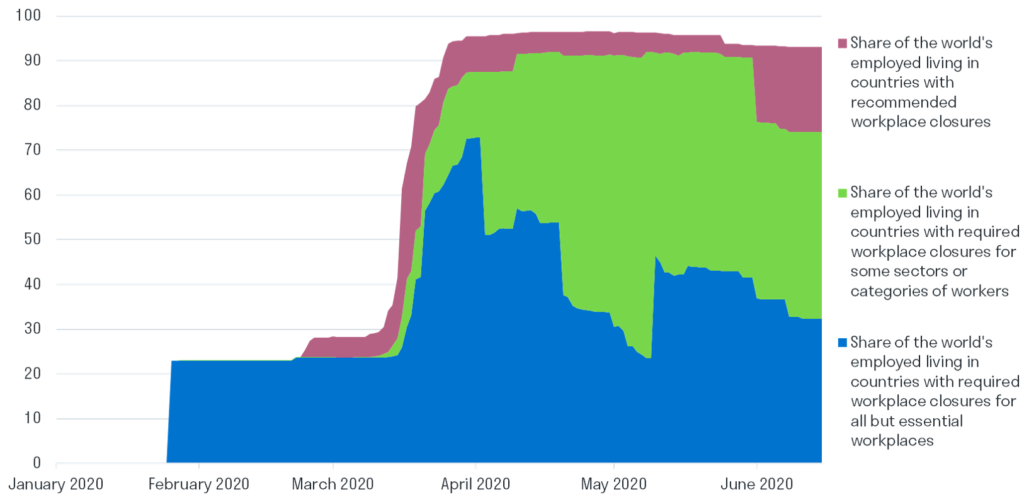But it risks fuelling discord
What has coronavirus changed? Whether or not we vanquish COVID-19, for most of us, life will never be the same. Perhaps the most far-reaching impact will be the inequities that it has exposed and exacerbated, fuelling discord within and between countries. The heartfelt global response to George Floyd’s death at the hands of US police is testament to these heightened societal tensions. It is now more important than ever that we respond proactively to deliver a cohesive economic model of growth.
The poorest are suffering most
To understand the scale of the damage to the most vulnerable, it is worth considering the United Nation’s recently updated projections for extreme poverty levels following Covid19. Instead of seeing poverty come down steadily by roughly 100 million by 2030, the UN now anticipates that the number will rise by around 40 million.
All around the world people are seeing livelihoods lost as a result of economic lockdowns. By the end of March approximately 50% of the global workforce was located in countries with required workplace closures1 (see chart). While, lockdowns have eased, analysis by the University of Chicago for the US estimates that 32-42% of COVID-induced job losses will be permanent2.
The IMF’s latest estimates are that the global economy will shrink by 4.9% this year, and the cumulative dollar loss in 2020 and 2021 to be $12.5trillion. In the US, around 55% of the lowest income households have seen a loss of income, versus just 28% for the wealthiest households (see chart below). While employment levels should return as lockdowns are eased, for the most vulnerable the impact has been devastating.
Figure 1: Relaxation of lockdown measures is leading to a declining share of workers in countries with general workplace closures

Source: ILOSTAT, ILO modelled estimates, November 2019, and Oxford COVID-19 Government Response Tracker
Against this backdrop, tensions are rising. As an investment manager, it is not just important that we understand this rapidly shifting world outlook, but we also need to consider carefully what role we should be playing as an owner on behalf of our clients in global businesses.
Critically, as shareholders we have a responsibility to press for responsible long-term behaviour that aligns with societal interests, not undermines it. We also have a voice backed up by voting powers that give us a say in who leads these companies. Looking ahead, we discern five key flashpoints that will require close scrutiny and, at times, determined action by investors.
1. Fair treatment of staff and employees
Having signed the ICCR Covid Investor Statement, we have initiated engagements with nine companies that are facing particular challenges in managing staff and supplier relationships during lockdowns.
While companies need to ensure their financial strength, they should do so in a way that is fair and responsible. We challenge companies that, for instance, continue to pay out large bonuses to executives, whilst making large numbers of staff redundant or cutting off suppliers.
2. Companies need to pay their fair share of tax
A second flashpoint is tax avoidance. Corporate gaming of tax rules is not new. But against the backdrop of ballooning government deficits and rising inequality, it takes on a new urgency.
If governments are to have the wherewithal to protect the most vulnerable, tax must be paid. Taxation is also vital to ensure governments can invest in critical infrastructure and public services such as education, the police and healthcare. In case we needed reminding, our experience with COVID-19 has demonstrated how a lack of investment in public healthcare can result in extreme costs for business.
Frustration over technology companies’ tax avoidance has already led to governments such as the UK and France imposing, or threatening to impose, supplementary taxes. Even in the US, where the government has attacked the Europeans for targeting American companies, the spotlight is being turned on corporate taxation.
None of this is helpful for shareholders. It is time that investors made clear their expectation that companies adopt a responsible approach to taxation, such that they are seen as part of a sustainable and equitable society.
3. Anti-competitive behaviour needs to stop
A third flashpoint that we expect to drive tougher regulatory action is anti-competitive behaviour. At this time of heightened awareness of social vulnerability, companies perceived to be exploiting their market dominance should expect more intense scrutiny. Again, this is not a new trend, but one we anticipate will accelerate as the public and, thus, politicians become less forgiving.
Shareholders need to encourage their companies to step back from practices that might be perceived as abusive and that could attract regulatory action. Digging heels in to defend dominant positions in markets – especially if supported by expensive lobbying campaigns using shareholders funds – will likely provoke a stronger government response, and anger the public.
4. Executive pay needs to come down
Another flashpoint that is certain to gather more steam is executive remuneration. While we have seen several senior executives take pay cuts to demonstrate solidarity with the broader workforce, what is less clear is whether the business leaders are willing to give up even more valuable share awards and options.
Shareholders need to be making clear to boards today that the pain must be shared fairly and this means for many that all elements of their pay packages need to come down. We have often argued that a more profound reset of executive pay to lower levels is overdue.
5. Dividends need to be sustainable
“I don’t want to give a bailout to a company and then have somebody go out and use that money to buy back stock”. When Trump made this statement, he captured rising public incredulity that companies may use generous tax payer bailouts to return cash to shareholders.
Ill-judged dividends is a fifth flashpoint that is eating away at public trust in business. Once again, investors need to make clear to their companies that dividends – like bonuses – are only appropriate where they are underpinned by a sustainable business.
Let's build back a more equitable society
The global uproar provoked by George Floyd’s death is testament to the rising anger over ongoing inequality – made worse by COVID. Our social fabric is fraying. Tensions are on the rise both within countries, and also between them. Trust in institutions is being tested. While covid has reminded us that our collective wellbeing depends on us coming together; there are real dangers that our failure to act to protect the more vulnerable will tear us apart.
This paper has argued that companies, supported by their investors, need to act. We have set out five specific flashpoints where investors should press companies to take steps that address rising tensions in society. By investing in their people, embracing their role as responsible taxpayers, avoiding egregious executive payouts and playing fair in the market place, executives will build a more resilient business. Only then can shareholders know their capital is being used to deliver a sustainable flow of earnings and dividends.



